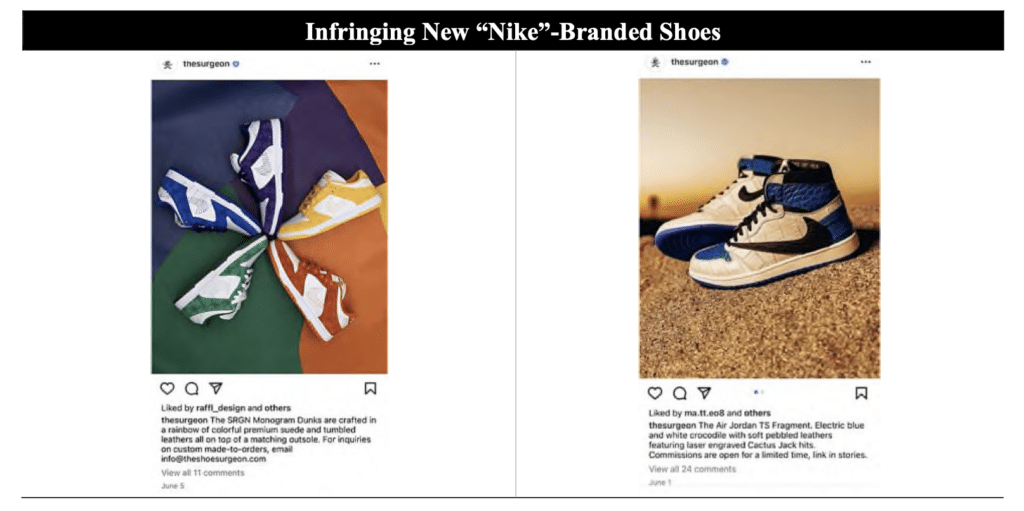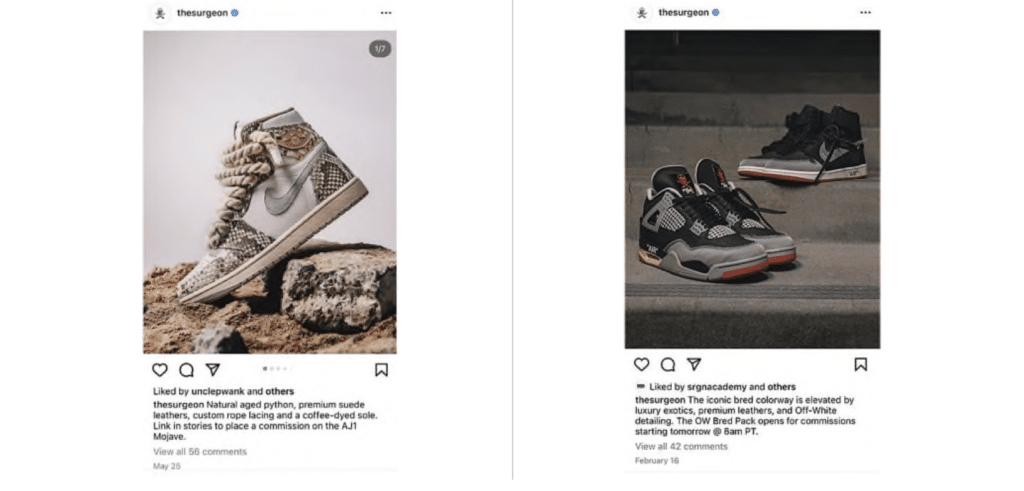Nike is looking to shut down a defamation counterclaim lodged against it by Dominic Ciambrone and his company, the Shoe Surgeon, in a legal battle centering on allegations of counterfeiting and trademark infringement. In a newly-filed motion to dismiss, the Beaverton, Oregon-based sportswear behemoth asked the U.S. District Court for the Southern District of New York to dismiss the sneaker-customizer-defendants’ defamation claim with prejudice, arguing that its statements about Ciambrone’s practices – including that he was producing “counterfeit” Nike sneakers “from scratch” as opposed to authentic “customized” goods – are shielded from litigation as a result of their ties to the case at hand.
The Background in Brief: The lawsuit got its start in July 2024, when Nike filed suit against Ciambrone and his companies – Surgeon Worldwide, Inc., S2 Services, and co-founder Dallas Imbimbo – for allegedly manufacturing and selling unauthorized sneakers bearing Nike’s registered trademarks. In particular, Nike alleges that the defendants are not customizing otherwise authentic Nike sneakers, and instead, are creating entirely new shoes that mimic the look and branding of Nike products, without Nike’s “involvement, oversight, or authorization.” And in case that is not enough, Nike also claims that the defendants are teaching others how to create counterfeit Nike sneakers by way of paid workshops.


Not long after it filed suit, Nike issued a public statement reinforcing its claims. In the statement, which was picked up by an array of media outlets, Nike asserted, “The Shoe Surgeon is constructing counterfeit ‘Nike’ footwear from scratch and selling it as officially branded product,” and at the same time, is “teaching others to create counterfeit ‘Nike’ sneakers.”
Ciambrone and co. responded to Nike’s public statement via an answer and counterclaims, in which they argued that Nike’s use of terms like “counterfeit” is defamatory and mischaracterizes their work, which they describe as “customization,” not counterfeiting. (The Shoe Surgeon also argues in its February filing that it is shielded from Nike’s case thanks to “fair use, the first sale doctrine, and principles around non-commercial use.”)
Defamation and a Potential Exception?
In a filing of its own on March 21, Nike urges the court to dismiss the Shoe Surgeon’s defamation counterclaim, arguing that statements made in connection with the lawsuit itself are absolutely privileged under New York lawand that its out-of-court statement is protected under Section 74 of the New York Civil Rights Law, which shields “fair and true” reports of litigation from defamation liability. The out-of-court statements in question “represent a substantially accurate report of the allegations in the complaint,” Nike argues, and thus, “cannot serve as the basis of the defendants’ defamation claim.”
Even if the language was “colorful,” Nike states that courts have routinely held that statements that do not exaggerate or materially misstate the claims in a lawsuit are protected.
To get around the statutory protections afforded to claims made in – and in connection with – litigation, the Shoe Surgeon points to a narrow exception carved out in Williams v. Williams, a decades-old New York Court of Appeals decision that allows a defamation claim to proceed if a party filed a lawsuit solely to defame the defendant. Addressing this in its motion to dismiss, Nike argues that the defendants fall short here, as they do not allege that it filed the lawsuit for the “sole purpose” of defamation – they only claim that the public statement was made for that purpose. The Williams exception is reserved for cases where a lawsuit is weaponized as a pretext for defamation, not for disputes where the legal claims themselves are valid, Nike claims.
At the same time, Nike states that the defendants, themselves, acknowledged in their answer and counterclaims that the case raises “tough questions” about trademark law and customization, thereby, undermining any claim that the suit is baseless or filed in bad faith.
THE BIGGER PICTURE: The case may be more than just a legal spat between a brand and a customizer and appears to be part of a broader reckoning around trademark enforcement in the burgeoning world of sneaker customization. As companies like the Shoe Surgeon blur the line between customization and potential infringement, brands like Nike are drawing sharper boundaries around what they consider acceptable use of their trademarks.
The court has stayed discovery on the defamation claim while it considers Nike’s motion.
The case is Nike, Inc. v. S2, Inc. d/b/a The Shoe Surgeon, et al., 1:24-cv-05307 (SDNY).














